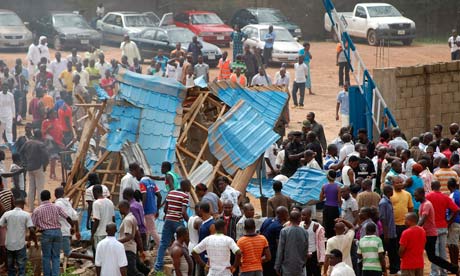Suicide bombings at three churches in northern cities of Zaria and Kaduna prompt state curfew amid fears of reprisal attacks

People gather outside a church in Kaduna, northern Nigeria, rocked by a suicide blast. Photograph: Olu Ajayi/AP
Three suicide bomb attacks on churches has rocked the northern
Nigerian state of Kaduna, killing at least 21 people and wounding about
100, officials said.
They prompted protests in a region that has previously been hit by religious tensions. The first two blasts occurred within minutes of each other and targeted churches in the city of Zaria, police said. A third blast hit a church in the city of Kaduna about half an hour later.
An official working for a relief agency involved in rescue efforts said 21 people had been killed and at least 100 people wounded. The Zaria attacks killed the bomber and at least one other person and left 51 wounded, a Nigerian Red Cross official said earlier. The Kaduna attack claimed 10 lives and wounded 29 people, he said.
Police said security prevented the suicide bombers from ramming explosive-laden cars into the churches. "If not for security, there would have been (many) more casualties," said Mohammed Abubakar Jinjiri, the Kaduna state police chief.
Churches have been increasingly targeted by violence in Nigeria. Last weekend, a suicide bomber detonated explosives outside a church in central Nigeria and gunmen attacked another church in the north-east, killing at least six people and wounding dozens of others.
Attacks on Christian holidays have claimed the most lives. An Easter Day blast in Kaduna left at least 38 people dead. A Christmas Day suicide bombing of a Catholic church in Madalla, near Nigeria's capital, killed at least 44 people.
Police arrested one of the bombers who survived. They declined to say who police suspected might be responsible, though the radical Islamist sect Boko Haram has claimed similar church attacks in the past.
BMore than 560 people have been killed in violence blamed on the sect this year alone, according to an Associated Press count.
The Nigerian Red Cross said young people had started protesting in Kaduna, leading the state government to impose a 24-hour curfew. Billows of smoke could be seen over a mosque in a predominantly Christian part of the city.
People mounted illegal roadblocks and were seen harassing motorists. A motorcycle rider in the same neighbourhood lay seriously hurt and bleeding by the roadside. Motorbike riders in the state are often presumed to be Muslim and become easy targets during reprisal attacks by Christians.
They prompted protests in a region that has previously been hit by religious tensions. The first two blasts occurred within minutes of each other and targeted churches in the city of Zaria, police said. A third blast hit a church in the city of Kaduna about half an hour later.
An official working for a relief agency involved in rescue efforts said 21 people had been killed and at least 100 people wounded. The Zaria attacks killed the bomber and at least one other person and left 51 wounded, a Nigerian Red Cross official said earlier. The Kaduna attack claimed 10 lives and wounded 29 people, he said.
Police said security prevented the suicide bombers from ramming explosive-laden cars into the churches. "If not for security, there would have been (many) more casualties," said Mohammed Abubakar Jinjiri, the Kaduna state police chief.
Churches have been increasingly targeted by violence in Nigeria. Last weekend, a suicide bomber detonated explosives outside a church in central Nigeria and gunmen attacked another church in the north-east, killing at least six people and wounding dozens of others.
Attacks on Christian holidays have claimed the most lives. An Easter Day blast in Kaduna left at least 38 people dead. A Christmas Day suicide bombing of a Catholic church in Madalla, near Nigeria's capital, killed at least 44 people.
Police arrested one of the bombers who survived. They declined to say who police suspected might be responsible, though the radical Islamist sect Boko Haram has claimed similar church attacks in the past.
BMore than 560 people have been killed in violence blamed on the sect this year alone, according to an Associated Press count.
The Nigerian Red Cross said young people had started protesting in Kaduna, leading the state government to impose a 24-hour curfew. Billows of smoke could be seen over a mosque in a predominantly Christian part of the city.
People mounted illegal roadblocks and were seen harassing motorists. A motorcycle rider in the same neighbourhood lay seriously hurt and bleeding by the roadside. Motorbike riders in the state are often presumed to be Muslim and become easy targets during reprisal attacks by Christians.
No comments:
Post a Comment